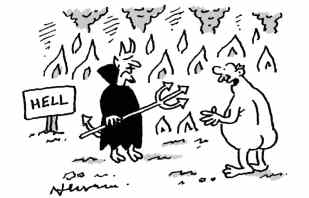Every Tory leader fears a plot against them. Their paranoia isn’t helped by the layout of Westminster, which lends itself to scheming. They worry about huddled groupings in the tearoom, cosy suppers in townhouses, and what’s said behind closed office doors in Portcullis House. It is no coincidence that before the publication of Sue Gray’s report the Tory whips were keen for their MPs to be in parliament, but once the report was released they were very happy for backbenchers to go home. MPs find it harder to plot when they’re away from the Commons.
Yet the truth is that if Boris Johnson faces a no-confidence vote it won’t be because of an organised attempt to topple him. There are too many disagreements among Tory MPs over when is the right time to strike. Some wanted to wait for the Gray report; others think they should see what this month’s by-elections bring; and some argue that they should delay until the privileges committee has come to a conclusion. MPs also can’t agree on who should succeed Johnson. And so there is no single, centrally directed movement against him. Instead MPs are coming to their own decisions.
The result is a trickle of no-confidence letters. If the 54-letter mark is hit and a no-confidence vote triggered, it will almost certainly be by accident rather than because one faction has decided to act. One MP with good links to all wings of the party remarks: ‘Nobody’s plotting, but strangely that’s more dangerous.’

There is also broader dissatisfaction about the direction of the government. One senior backbencher complains: ‘How many people who are actually Conservative are impressed by this government?’
At the moment, No. 10 is relatively unconcerned about all of this. Those who have seen Johnson recently report that he is in bullish mood. They hope that with the end of the Met investigation and the publication of the Gray report, No. 10 is finally moving beyond partygate. Yet there are some who think Johnson’s team should be more worried than they are. ‘One of the reasons I’m concerned is that people who should be concerned are rather blasé,’ says one Johnson loyalist. ‘This could easily tip over.’
‘How many people who are actually Conservative are impressed by this government?’
In some ways, the situation would be easier for Johnson if there were a coordinated plot against him. In those circumstances, there would be a better chance of working out which backbenchers would be most likely to write letters of no-confidence and then persuading them not to. In January, Johnson’s supporters – the so-called ‘shadow whipping’ operation – successfully stabilised his position by ensuring that those who were undecided about the Prime Minister’s future could speak to him about their grievances.
The current discontent is trickier for Johnson because it spans intakes and ideological groupings. When both Bob Neill, a lawyer who campaigned for Remain, and Steve Baker, a libertarian Brexiteer, are among those publicly urging the Prime Minister to go, it is hard to work out who else will be joining them. ‘The danger for Boris is that it is from all wings of the party,’ says one well-connected MP.
If 54 letters are submitted and there is a no-confidence ballot among Tory MPs, Johnson’s backers are confident he would win reasonably comfortably, given how little agreement there is on who should succeed him. Yet such a vote would drain authority from the PM even if he does get through it: Theresa May survived her no-confidence challenge with almost two-thirds of the vote, but was still gone six months later.
Some Tory MPs are sceptical that the threshold for no-confidence letters will be met in the first place. As one MP puts it: ‘Everyone has been up this hill before.’ There have been several occasions when people thought a no-confidence vote was inevitable, only for nothing to happen. But as one backbencher observes, there have been steadily more letters coming in than going out for quite a while now. There are rumours that after the Jubilee weekend a couple more will be submitted.
This latest bout of leadership speculation comes at a time when the government faces two other massive challenges. The first is the cost of living. The financial package unveiled by Rishi Sunak last week – which will see every household get £400 off their energy bills, and almost the entire cost of the rise in energy prices picked up for those on means-tested benefits – is the government’s biggest intervention in this crisis. The size and scale of the measures reflect the government’s view that the increase in energy prices is so great that without steps to alleviate the situation there would be a recession as well as huge hardship. It is a sign of just how severe the crunch on living standards will be that even the government’s spending more than £20 billion is not going to solve the problem but simply make it less acute.
The second challenge for the government is that the initial western unity against Russia’s invasion of Ukraine is beginning to fray. The European Union is struggling to agree on another round of sanctions, and the tensions between France and Germany, who are still talking to Vladimir Putin, and the more hawkish Nato states are becoming more pronounced. Whitehall is worried that Putin will attempt to use surging global food prices to try to get other countries to pressure Ukraine to cede territory so that exports can resume. Averting the fracturing of the West’s anti-Putin coalition will be a major challenge for British diplomacy.
The next few weeks will be a test of Johnson’s famed survival skills. If on 23 June, as many Tories expect, the party lose the two parliamentary seats they are defending in by-elections, he will once again be at a moment of maximum vulnerability.






Comments